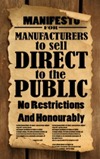 Publishing Perspectives has another of those guest-column-cum-self-promotional pieces it runs every so often, this one from Jonas Lennermo, creative director of Publit—the company who provides the e-commerce solution used by Harlequin Scandinavia, as well as several large and 200 small publishers in Scandinavia.
Publishing Perspectives has another of those guest-column-cum-self-promotional pieces it runs every so often, this one from Jonas Lennermo, creative director of Publit—the company who provides the e-commerce solution used by Harlequin Scandinavia, as well as several large and 200 small publishers in Scandinavia.
Lennermo discusses the benefits of publishers selling their books D2C (Direct To Consumer), bringing up O’Reilly and McSweeney’s as examples. (But not Baen, for some reason. Everyone always seems to forget about Baen.) But while O’Reilly and McSweeney’s are publishers who know how to do D2C with smashing success, they also use proprietary, self-developed systems that are not within most small publishers’ means to duplicate. (For that matter, so does Baen.)
Of course, there just so happens to be a little Scandinavian company that can help with that…
Advertising aside, Lennermo does discuss some of the benefits of going D2C:
You know who’s reading what, when and where, you know how much they are willing to spend, and you have complete control to tailor your bid in every single detail. It’s all there for you.
And he also discusses the “new mindset” it requires—D2C publishers can no longer stay the faceless suppliers of bookstores, but have to develop their own relationships with readers.
It’s not about ads, fancy logos or catchy slogans. It’s not about adding a superficial layer of marketing fluff to smudge your favorite stories. In fact, it’s quite the opposite. There are a plethora of buzzwords – freemium, content marketing, evangelists and the like – which are just industry circumlocutions of something that’s quite straight forward. Tell people why the stories you sell are your favorite ones. Be relevant. Be accessible. Be honest.
But as awesome as going D2C is, and as popular as it seems to be in Scandinavia, most US publishers haven’t gone anywhere near it. In a separate discussion seed post, Edward Nawotka wonders why that is:
So what is the problem? Is there a fear of disintermediating the existing retailers by going direct? Maybe, but that seems like a moot point in the face of the fierce competition out there. Is it a general lack of a standardized file format for e-books and the proprietary silos (real or imagined) that various retailers have set up? What’s the trouble?
In thinking of that question, I’m reminded of the exchange from Restaurant at the End of the Universe between the Vogon, who was hired to kill Zaphod Beeblebrox, and Beeblebrox’s psychiatrist, Gag Halfrunt:
"A personal friend?" inquired the Vogon, who had heard the expression somewhere once and decided to try it out.
"Ah, no," said Halfrunt, "in my profession you know, we do not make personal friends."
"Ah," grunted the Vogon, "professional detachment."
"No," said Halfrunt cheerfully, "we just don’t have the knack."
When it comes to building a relationship with consumers, most publishers “just don’t have the knack” either. Why should they? They’ve never had to before. And if there’s one thing we can learn from the way publishers have fought tooth and nail to try to prop up their ailing paper market by keeping the prices on e-books high, it’s that they’d rather be dragged into court (well, two of them would, anyway) than learn how to do something new.
(Though, weirdly, at one point Tor—subsidiary of scrappy lawsuit fighter Macmillan—insisted that it was going to start selling e-books D2C itself. That was the whole point of its big Tor.com e-book giveaway—which included a lot of first-of-series books that ticked people off because they couldn’t get the sequels electronically too. I can’t recall whether the Tor e-book store ever materialized even briefly, but needless to say if you go to the Tor/Forge website now, you only get directed to other vendors to buy. And that’s leaving aside the two-day wonder that was Tor Webscriptions.)
You can also see it in the mindset publishing execs have which makes them address their statements to fellow industry insiders, ignoring the fact that consumers can and will read them too. (Hey, Mr. Sargent, we can hear you talking about us as if we’re not here. It doesn’t make us happy.) Perhaps they should read the Cluetrain Manifesto—a guideline to how companies should interact with net-savvy consumers, published over ten years ago but apparently still not taken to heart by publishers yet. If they want to sell to consumers, they’ll have to come down out of their ivory tower and start listening to us.
There’s also that point Mike Shatzkin touched upon in his column last week and his letter yesterday: publishers who would sell D2C face the catch-22 of either letting Amazon out-discount them or having Amazon claim that its own margins should be based on a publisher D2C discount price rather than suggested retail.
I don’t know how this is all going to work out. Perhaps one or more publishers will pull its e-books from Amazon and set up D2C (being careful to do so one at a time so they can’t get accused of colluding!), perhaps getting Amazon and other booksellers to give it referral links. Pottermore has shown that it can be done. if you have content people really want. Surely a whole publisher should be able to do that at least as well as a site devoted to only seven books. And for that matter, Baen doesn’t sell its e-books on Amazon either.
When you get right down to it, though, going D2C means publishers will have to get over their reluctance to talk to consumers. It puts me in mind of the ending of Demolition Man, when John Spartan turns to the prissy establishment leader and tells him to get a little dirty, then turns to the underground resistance leader and tells him to get a lot cleaner, so they can meet in the middle. I think that publishers and consumers are going to have to do the same.
































Thank you for alerting me to Baen – interesting, impressive, site.
Perhaps Packt (http://www.packtpub.com/about) also worthy of consideration in this context?